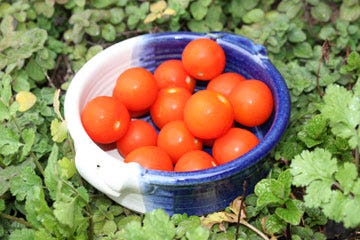
Warmer weather is sneaking in the backdoor. Daylight savings is just days away. Wildflowers are popping into bloom in the Highway 90 median. All the signs of spring agree: It’s time for local gardeners to get their hands dirty. Local garden experts agree, most plants for herb and kitchen gardens can be started by mid-month, so the time to prepare the soil is now. The biggest dangers to a kitchen garden are heat and rain, so time is of the essence. The first two steps to a home garden are getting nutrients into the soil and creating good drainage for plant roots, said Lisa Summers, who holds a horticultural degree from Pensacola State College and owns Green Day Landscaping in Pace. “Our ground here—everything’s really sandy,” she explained. “You really want to put some organics in it. There are no nutrients in that sandy soil.” She recommended building a raised bed garden, or garden box, then mixing the native sandy soil with homemade compost or a store bought garden soil mixture. The elevated box helps the soil to drain throughout the coast’s soggy summer weather, protecting the plant roots. Anyone can make homemade compost in a composter or by piling grass clippings, vegetable peelings, leaves, and other plant-based material (no meat, waste or protein) and waiting for it to decompose into compost. Hate to wait? Local feed and seed stores carry plant-based derivative compost, organic mushroom compost, and bagged garden soil. Once the garden has good drainage and nutrient-rich soil, it’s time to get planting. Good crops for early spring include tomatoes, jalapeño and bell peppers, cucumbers, squash and herbs. Grape and cherry tomatoes especially are good for beginners. “If they get them in too late, we start getting to much rain,” Summers warned. “They actually do better when they get an early start. They may also need to look at using a fungicide that’s safe for vegetables, in the Florida climate, since we have so much rain. Everything gets fungus on it really easily. That’s one of the major problems that rot out small gardens. We get a bunch of rain, and the next thing you know the tomatoes are getting a bunch of blight.” Roots should not have wet feet, Summer said. The soil needs to dry out between each watering, or the roots will be susceptible to root rot. Loose, well-drained soil is the best guard against too much moisture. “Last year we had a lot of rain, and all your residential people that have gardens, they just got rotted out,” Summer remembered. “Florida is a hard place to grow vegetables.” Citrus trees can add a pop of color to the landscape as well as a refreshing treat. Satsuma and Hamlin oranges are more cold resistant and better suited to life north of I-10, but citrus should be kept in a pot so it can winter indoors, or be planted close to the southern side of a house or other structure to protect the tree from harsh north winds. Herbs are ready to grow this time of year, as longs as the soil stays well-drained. Rosemary especially is a good pick for local gardens, and can be used in landscaping as well as the garden. Basil is picky, Summer warned, and needs full sun and dried out soil. Kelly Banfield, owner of Banfield Lawncare and Landscaping in Pace, also recommended growing onions and peas, but cautioned gardeners to keep a sharp eye on evening temperatures as tender shoots begin to sprout. “If it’s going to dip down close to 32 (degrees Fahrenheit), you would most definitely want to cover them, because at their size they would be very, very tender,” he said. Starting a kitchen garden with starter plants makes gardening easier, he explained, because the plants are more mature and healthier, so they’re hardier than plants sprouted from seed. Banfield’s new favorites for spring 2014 include Baskets of Fire, a unique pepper plant that can hang or sit in a tabletop planter, bell peppers with a little spice, new breeds of hibiscus and Sunpatiens, ornamental grass and Japanese maples. His nursery, which opened last year and reopens for the 2014 season at the end of March, specializes in plants fitted to the local climate. “We grow them because we know them here,” he said. “We research the best crops, the best plants for this area. The majority of our plants are grown right here in Pace. We take pride in selecting the best plants that will thrive in the conditions that we have.”
This article originally appeared on Santa Rosa Press Gazette: Time is Right to Start Kitchen Gardens
